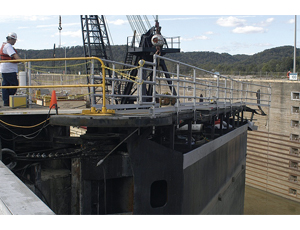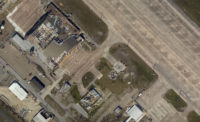Three contracts funded through the American Recovery and Reinvestment Act are helping speed the U.S. Army Corps of Engineers’ rehabilitation of the Markland Lock, near Warsaw, Ky., on the Ohio River. The contracts come after a catastrophic malfunction put the lock’s downstream gates out of commission.


“This is a needed shot in the arm for the project and the economy,” says Col. Keith Landry, commander of the Corps’ Louisville District. “It is work that needs to be done sooner rather than later.”
The three ARRA contracts total $6.87 million. The Corps estimates they will generate about 100 direct jobs. They are feeding into and accelerating a long-scheduled, incrementally funded, $35-million maintenance and upgrade of the 45-year-old facility. The largest contract awarded so far is a $17.4-million, non-ARRA-funded contract for fabrication and assembly of replacement miter gates for the 1,200-ft-long by 110-ft-wide main chamber. Delivery of the gates was scheduled for December 2010 but now is accelerated to March 2010.
The first ARRA contract, for $1.768 million, was awarded on July 20 to HTA Enterprises Inc., Vine Grove, Ky., for construction of an assembly pier to receive and stage installation of the four new 250-ton gate leaves to open and close the locks.
Another $1.5 million AARA-funded contract was awarded to Climax Portable Machine Tools Inc., Newberg, Ore., for fabrication of a custom “portable” milling machine and associated hardware. They are to be used on-site to dress the steel “coins,” or mating faces, embedded in the lock walls, to make a tight seal with the new doors. The work is expected to employ 35 to 40 people, mostly from Oregon.
The third ARRA contract, awarded on Sept. 28, is for $3.6 million for fabrication and installation of culvert valves under the main lock chamber to control the raising and lowering of water in the lock. The contract was awarded to Q.B.S. Inc., Alliance, Ohio. The contractor will begin assembly of the new valves in October and has one year to deliver.
The portable milling machine promises to be innovative. Joseph Rarick, regional sales manager for Climax Portable Machine Tools, says the company specializes in creating equipment to take machine-shop services to the field. The usual approach to refurbishing coins in a lock is to cut them out and replace them, he says. The portable milling machine, however, will fasten to the wall and travel up and down the 50- to 70-ft-long, 8- to 10-in.-wide coins and resurface them in place.
“The milling machine will true it up nice and square,” Rarick says. The machine will become property of the Corps and is re-usable on other lock projects.



Post a comment to this article
Report Abusive Comment